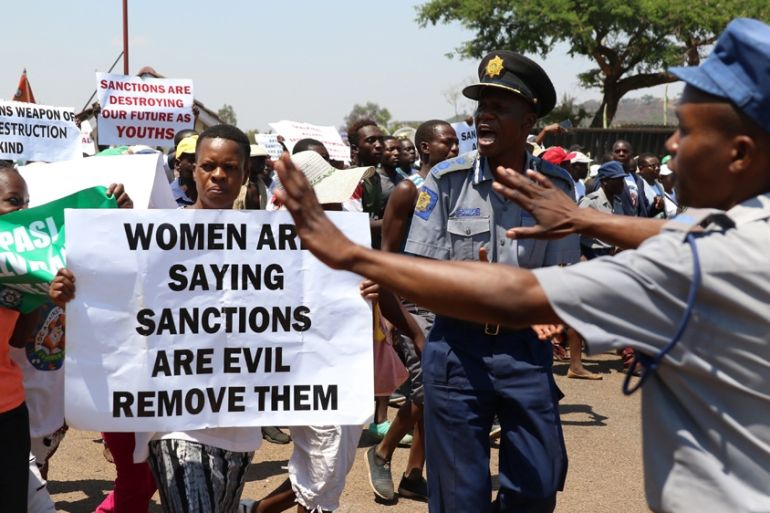Zimbabwe calls US extending sanctions ‘baffling’
The United States first imposed sanctions, including financial and travel restrictions, in 2003.

Zimbabwe on Thursday said it was dismayed by the White House’s “baffling” decision to extend sanctions against members of the southern African country’s government over rights abuses.
The United States first imposed sanctions, including financial and travel restrictions, in 2003 against then-President Robert Mugabe, members of his inner circle and state companies over rights abuses and rigged elections.
Keep reading
list of 3 itemsCyclone Idai: Thousands still struggling to cope
Zimbabwe’s food crisis: ‘Food security is national security’
Zimbabwe’s secretary for information, Nick Mangwana, said the “government has noted with dismay the White House message” extending the sanctions for another year.
|
|
“Once again the government of the United States has chosen to strangely characterise Zimbabwe as a country that poses an extraordinary threat to the foreign policy of the United States,” Mangwana said in a statement.
“We find this a baffling position.”
The White House said following Mugabe’s removal in November 2017 and the July 2018 general election, “Zimbabwe has had ample opportunity to implement reforms … and open the door to greater cooperation” with the US.
“Unfortunately, President Emmerson Mnangagwa’s administration has yet to signal credible political will to implement such reforms,” it said.
“Indeed, the Zimbabwean government has arguably accelerated its persecution of critics and economic mismanagement in the past year, during which security forces have conducted extrajudicial killings, rapes, and alleged abductions of numerous dissidents.”
But Zimbabwe’s government said it “strongly objects to the unfounded assertion that its security forces engaged in acts of extrajudicial killings and rape against its own citizens in the last year”.
In January last year at least 17 people were shot dead and scores injured when authorities deployed soldiers to break countrywide protests sparked by a more than 100 percent increase in the price of fuel.
Mnangagwa blames the sanctions imposed by the US and the European Union for Zimbabwe’s economic ills and says they are intended to remove his ZANU-PF party from power.
In November, Hilal Elver, the United Nations special rapporteur on right to food, suggested economic sanctions by the US and the EU against officials and entities linked to the governing party over alleged abuses are contributing to Zimbabwe’s current dire food security situation.
Elver said 60 percent of Zimbabwe’s population, some 14 million people, is considered food-insecure, “living in a household that is unable to obtain enough food to meet basic needs”.